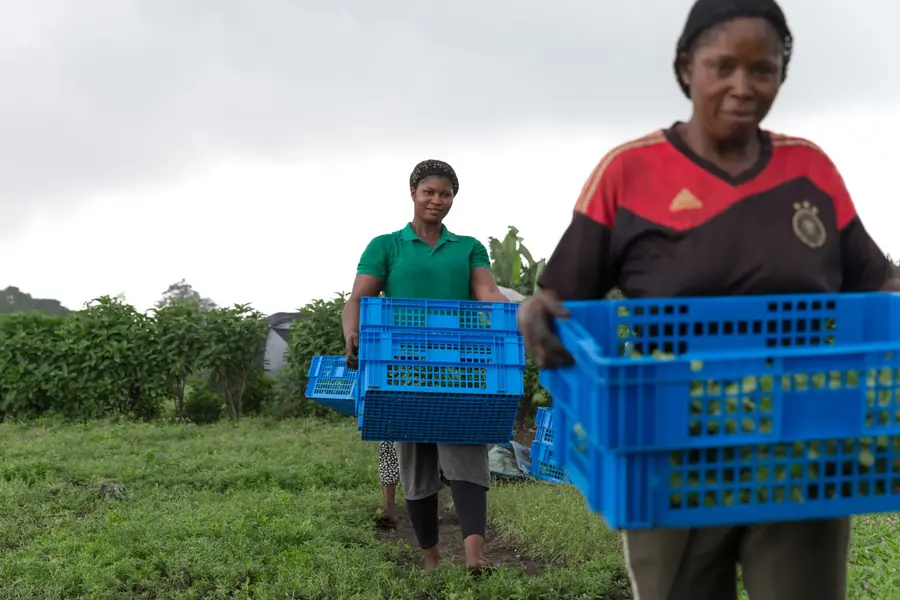Effective, reliable cold chains are foundational to resilient African food systems. By keeping produce fresh from farm to market, cooling reduces post-harvest losses, stabilises incomes, and unlocks access to higher-value buyers. Yet across much of the continent, the high upfront cost of equipment, compounded by volatile energy prices and limited technical capacity, keeps essential infrastructure out of reach for those who need it most.
This is where business model innovation, such as Cooling-as-a-Service (CaaS) comes in. CaaS shifts customers from buying equipment to buying outcomes. Farmers, cooperatives, and traders can pay for the cooling they need on a pay-as-you-go or subscription basis. Specialist providers handle design, installation, maintenance, and performance, which can improve reliability and lower technical and financial risk for users. Applications include shared cold rooms, packhouses, and refrigerated transport, with models adapted to local contexts.
This article reviews pioneering organisations deploying CaaS across African agricultural cold chains. The growth and impact of their solutions is demonstrating how service-based approaches can expand access to sustainable, inclusive cooling, including underserved rural areas, and help strengthen the continent’s cold chain infrastructure:

From the field to storage
Ghana, Uganda: AkoFresh connects the fields to cold rooms
Building on its existing deployment of cold storage units available on a pay-per-use basis, AkoFresh piloted an innovative fleet of solar-powered refrigerated tricycles in June 2025, in partnership with a horticulture cold chain project supported by the Netherlands Embassy in Accra.
These tricycles are designed for farm-to-market preservation and last-mile logistics. They are offered on a pay-per-use rental model, primarily to facilitate the transportation of produce from farms to markets or processing centers. This cooled transport link between farms and markets is vital for reducing post-harvest losses by keeping perishable crops fresh during transit.
The initiative represents a significant step toward mobile, distributed cold storage solutions that complement stationary facilities and respond to the realities of rural value chains.
To support farmers and agribusinesses beyond storage, AkoFresh has also upgraded its digital marketplace, allowing users to book cold storage space and directly connect with farmers for improved market access.
Impact of CaaS
AkoFresh speaks to a seamless cold chain vision, where the mobile tricycles serve as extensions of its 2 established cold storage hubs, currently serving 5 communities in Ghana, with a growing presence in both the Ashanti and Greater Accra Regions.
Their digital platform is designed so that smallholders can store produce in cold rooms and then connect with last-mile logistics, presumably including tricycle transport, to reach buyers without quality loss.
Since its launch, AkoFresh has trained more than 3,000 farmers in post-harvest management and provided reliable storage services, while preventing an estimated 500 metric tons of CO₂ emissions. The company’s impact was recognised in 2024 with the UNIDO Director General’s Global FoodTech Award, underscoring its role at the intersection of food security and climate action.
Next Steps
Looking ahead, AkoFresh’s vision is to scale operations to 15 communities in Ghana over the next three years and replicate its model in other African markets. To achieve this, the company is developing a modular plug-and-play cold room design to cut costs and speed deployment. AkoFresh is actively seeking grant and equity funding, technical support for real-time monitoring systems, and partnerships with agro-processors, government agencies, and farmer-based organisations.
Strategic partnerships are expanding regionally: a solar-powered freezing hub for a Nigerian fishing community launched in July 2025, and through participation in the EU Horizon Europe-funded SUNNY Consortium, AkoFresh is preparing to pilot its solution in Uganda, demonstrating cross-border scalability.

At the packhouse
South Africa: Letaba Pakkers’ storage center shifts to Energy Partners’ CaaS solution.
Letaba Pakkers, exporting avocados for Dole in South Africa, was struggling with an ageing refrigeration system in its packhouse, facing refrigerant leaks, unstable cooling and escalating maintenance. This posed risks to the quality of its products and market access, given the sensitivity of crops and strict export protocols. Energy Partners invested ZAR 3.7 million to design, build, and operate a high-efficiency ammonia refrigeration plant under CaaS for the facility located in Limpopo, South Africa. By shifting to CaaS, the company gained access to modern, high-efficiency infrastructure without the financial burden of capital expenditure or performance risks.
The results are already visible. The new system has cut Letaba’s energy use by around 20%, while avoiding more than 4,200 tonnes of CO₂ emissions over a 10-year term. The cold rooms now consistently maintain strict temperature and humidity set points, safeguarded by 24/7 monitoring and guaranteed uptime. For a packhouse handling export-sensitive produce such as Maluma avocados, this reliability is crucial.
Impact of CaaS
Delivered under a Cooling-as-a-Service agreement, the project required zero upfront capital from the client, who now pays a predictable monthly fee for cooling delivered. Energy Partners retains ownership of the plant and is responsible for performance, maintenance, and efficiency throughout the contract period.
The CaaS model also represents an important financing innovation. By shifting the project from a capital expenditure (CAPEX) to an operating expense (OPEX), Letaba avoided a large upfront investment and gained cost predictability. Energy Partners, in turn, finances the asset on its balance sheet, recovering costs over time through service payments. This arrangement transfers technical and performance risks to the provider, while giving the client flexibility to focus on its core business.
Reflecting on the partnership, a Letaba Pakkers representative noted:
“Energy Partners really are your partner because they financially come to the party. They carry that burden. You pay on a monthly basis for having the cooling available, and for the amount of cooling you use. So we can predict and budget during our peak time what we’re going to pay. Cooling is a major factor in our business. Temperatures have to be 100% correct. A half a degree difference is massive”. – Mark Andrew, Dole Avocado Product Manager
Next steps
Looking forward, Energy Partners has signalled its intent to scale the model to other agricultural and industrial facilities in South Africa and beyond. For Letaba, the immediate priority is to leverage its strengthened cold chain to expand export volumes. The case demonstrates how CaaS can deliver a “triple win” for clients, providers, and the environment, unlocking reliable infrastructure while advancing sustainability goals.
More information is available in a recent video on the project.

At the cold room
From Tanzania, Zambia, to the DR of Congo, and Ghana: DGRID Energy delivers Solar Cool Cubes-as-a-Service that saves energy (and may one day issue carbon credits!)
DGrid Energy is transforming food cold chains with its sustainable, scalable cooling solutions tailored to underserved communities. Operating through a mix of direct sales, leasing, and CaaS, DGrid brings cold storage access to farmers, cooperatives, traders, and agro-dealers. Its ‘Solar Cool Cubes’ and grid-tied cold storage units support the preservation of fruits and vegetables, ripening, and dairy processing. With over 50 units deployed across Tanzania, Zambia, the Democratic Republic of Congo, and the United States, DGrid is now expanding operations to Ghana.
CaaS Impact
CaaS can provide affordable cold storage whilst supporting the reduction of post-harvest losses, preservation of product quality, and access to higher-value markets, without requiring farmers to invest in their own equipment.
In Ghana, the company is rolling out CaaS for fruits and vegetables to vendors in Accra’s largest local market. It is also establishing partnerships with hub agro-dealers to scale CaaS across nine African countries, beginning with Ghana and Tanzania. The model expands cold storage access for smallholder and commercial farmers while creating new revenue streams for the dealers themselves.
In Tanzania, its CaaS partnership with a banana ripening company has benefited 8,000 farmers, achieving 96% unit utilisation and 33% reduction in electricity costs. Under CaaS, the company has grown significantly, now employing 300 full-time and 200 part-time workers.
To support its services, DGrid has developed a digital asset management platform enabling 24–48 hour after-sales support and real-time emissions tracking. DGrid has co-developed a carbon credit methodology with SGS and Rocket Consulting for participation in the voluntary carbon market.
Next steps
As governments and development partners increasingly recognise the role of cold chains in food security and economic development, DGrid is gaining traction. The company is now preparing a capital raise to deploy 50 additional CaaS systems across Tanzania, Ghana, and Senegal, and is seeking co-investment and joint venture opportunities with partners in solar, refrigeration, and marketing.
Nigeria: ColdHubs expands cold storage access for food security
ColdHubs is expanding its CaaS presence across Nigeria, offering solar-powered cold rooms under a CaaS model at key agricultural markets and delivering a measurable impact in reducing post-harvest losses and improving food security. The company also operates “Ice Points,” which include both storage and freezing services.
Impact
To date, ColdHubs activities have helped to save more than 14,000 metric tons of food from going to waste. An additional 20,000 metric tons have been preserved during transportation, supporting a steady supply of fresh food to both rural and urban areas.
The service also contributes directly to higher incomes. With access to cold storage, food sellers experience less spoilage and gain more control over pricing and timing. This leads to improved earnings and stability, especially for female traders, who represent a large share of ColdHubs customer base.
Next Steps
The company continues to grow, focusing on regions with the greatest need. It is currently building new cold rooms in underserved areas, using data to identify post-harvest loss hotspots. Looking ahead, the company aims to scale its model across Nigeria and into West Africa. It is actively seeking funding, investment, and grants to support new cold room construction, technology improvements, and operational expansion. ColdHubs welcomes collaboration with organisations that share its commitment to sustainable agriculture, food preservation, and rural economic empowerment.
| Coldhubs & LeapEnergy x YourVCCA: the launch of Smart Cool Markets |
|---|
To address the high rates of post-harvest food loss in Nigeria, the Your Virtual Cold Chain Assistant Initiative (YourVCCA) has launched an innovative new pilot: Smart Cool Markets.Developed in collaboration with ColdHubs and LeapEnergy, YourVCCA has launched a brand new feature of its Coldtivate® app: Smart Cool Markets, a digitally connected cold chain marketplace. This new feature allows farmers and cooling service providers to track stock levels and shelf life in real time, thanks to sensor-linked digital twins, while buyers can access accurate produce availability and make digital payments directly through the app.The idea came to life over multiple visits to markets where the Coldtivate app was used by farmers and cold room operators, such as Lagos’ Mile 12 market, where improvements linked to the increased access to cold storage, thanks to the Cooling-as-a-Service model, were in some cases canceled out by the lack of certainty regarding the sales of stored crops. Indeed, meeting with local traders revealed the high perceived risks of paying to store produce that may remain unsold. During a conversation with a young merchant, the idea of selling crops online the same way local communities shop on platforms like Jumia or Kong arose, shaping the vision behind Smart Cool Markets. Therefore, Smart Cool Markets transforms cold rooms into fully functional sales points. Developed with support from the Swiss REPIC platform, the feature allows farmers to list produce for sale immediately upon arrival at the cold room. Buyers can view available stock, see the remaining shelf life calculated using sensor data and scientific models, and complete purchases digitally. In some cases, delivery options are also available through partnerships with local logistics providers. By linking reliable cold storage with digital marketplace capabilities, Smart Cool Markets empowers farmers to reduce food waste, access fairer prices, and increase income. It also improves transparency and trust in transactions, strengthens supply chain resilience, and supports data-driven decision-making for all market actors.YourVCCA is a initiative led by BASE Foundation and part of the SET Alliance. Learn more> |

Homes and small businesses
The multiple fridge and freezer innovations of Koolboks
Koolboks, a solar-powered refrigeration pioneer, has distributed more than 9,000 of its solar-powered fridges across 25 countries, with operations anchored in Nigeria, Kenya, and Uganda. Targeting small businesses and community enterprises, the company’s solutions provide affordable, reliable cooling to users ranging from fishermen and food vendors to hospitals and pharmacies.
“Our mission has always been to make refrigeration affordable and accessible to everyone who needs it. Until now, we had mainly achieved this through our own Koolboks products. But if we are truly committed to broadening access, we knew we had to go further. This is what led us to develop a new set of initiatives.” – Deborah Gael, Co-founder and COO
Koolboks has also developed a Pay-As-You-Go (PAYGO) locking technology that can be applied to any freezer brand, enabling flexible repayment models for low-income users. To add to the clean energy aspect, the newly launched PowerFoot pedestal allows conventional AC freezers to run on solar power, expanding the affordability and accessibility of sustainable cooling. In May 2025, Koolboks also officially launched KoolBuy, a “Buy Now, Pay Later” (BNPL) platform that lets customers purchase any freezer brand with as little as a 10% down payment, repaying the balance over time. More than 200 retail stores in Nigeria have already been onboarded, with a target of 500 by year-end.
Impact of CaaS
By lowering upfront costs, derisking ownership, and providing predictable payment structures, Koolboks is breaking down barriers to cleaner cooling adoption. Notably, 70% of Koolboks customers are women, underlining its commitment to inclusive growth. By enabling off-grid and grid-constrained communities to access refrigeration, Koolboks has helped reduce food waste and improve livelihoods, while cutting greenhouse gas emissions. Partnerships with major players in Nigeria’s dairy and beverage sectors are now piloting Koolboks systems across distributor networks, signalling a move from individual sales toward strategic collaborations with established brands.
Next steps
Looking forward, the company is preparing to roll out a Scrap-for-New program, enabling customers to trade in inefficient freezers for smart, solar-ready models on flexible terms. Policy developments such as Nigeria’s Electrification Project and the World Bank’s DARES program are creating fertile ground for scale, with Koolboks already positioned as a key provider.
Recognised by Bloomberg as one of Africa’s “25 Startups to Watch in 2025,” Koolboks is now pursuing new investment, partnerships, and policy engagement to extend its mission: delivering clean, affordable cooling to millions across emerging markets.
Conclusion
Cooling-as-a-Service continues to gain momentum, facilitating the mainstream adoption of affordable cold storage facilities worldwide. A testament to this is BASE’s Foundation’s recent selection as a finalist for the Zayed Sustainability Prize, recognising their project focused on expanding the model globally.
If you are an innovator looking to make an impact in cold chain solutions, BASE’s initiative Your Virtual Cold Chain Assistant and the SET Alliance offer a comprehensive suite of tools to support your journey. These include standardised contracts, pricing tools, and a full onboarding kit for the Cooling-as-a-Service (CaaS) model and the Coldtivate app. Learn more about Your Virtual Cold Chain Assistant’s Onboarding Kit and the CaaS resources.
You can also catch up on the latest insights and innovations by watching the E-Summit recordings!




